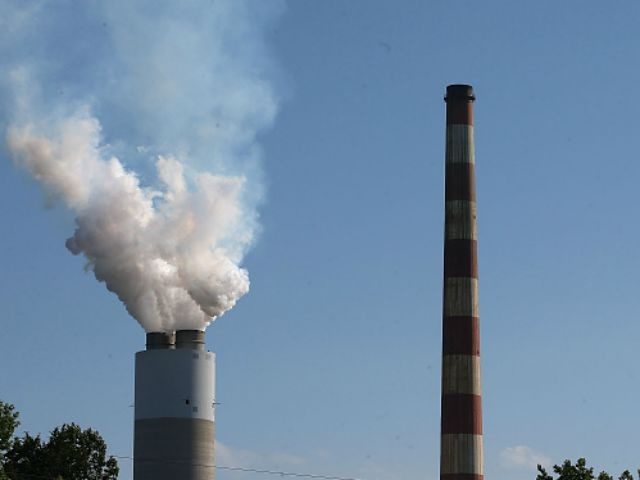U.S. coal plant emissions of carbon dioxide fell 12 percent from 2008–2013 as plants switched from burning coal to natural gas, reports a new study from the left-wing climate activist group Ceres.
The Ceres report, “Benchmarking Air Emissions of the 100 Largest Electric Power Producers in the United States 2015,” examined the emissions of the 100 largest U.S. electricity generating companies as reflected in filings with government agencies.
While there’s no disputing that CO2 emissions from U.S. power plants are down, it’s not at all clear that the reduction is mainly attributable to coal-to-gas switching or that the emission reduction is at all meaningful.
Another study released this week by an international team of researchers and published in the journal Nature Communications examined U.S. power plant emissions between 1997 and 2013, and reported a comparable 11 percent decline in CO2 emissions during the period 2007-2013.
But while Ceres was quick to attribute the emissions decline to fuel switching without doing any actual analysis, the Nature Communications study researchers noted at the outset of their study that, “the factors driving the decline have not been quantitatively evaluated; the role of natural gas in the decline therefore remains speculative.”
After examining factors such as population, consumption patterns and volume, production structure, fuel mix, energy intensity and emissions, the Nature Communications study authors concluded that, “After 2007, decreasing emissions were largely a result of economic recession with changes in fuel mix (for example, substitution of natural gas for coal) playing a comparatively minor role.”
The difference between the Ceres report and the Nature Communications reports is more than an academic one, with the latter study inadvertently putting its finger on the actual crisis in the American energy industry: the lackluster economy.
There is no question that the apparently unending glut of natural gas due to hydraulic fracturing has reduced prices to where electric utilities are replacing coal with natural gas wherever they can. Regulatory pressures from the Obama EPA have also played a key role in helping to make burning coal and maintaining coal plants less economical. Where this happens, CO2 emissions are immediately cut in half while the price of electricity to the consumer stays pretty much the same as with coal.
Ostensibly this sounds great. Low-cost energy with half the CO2 emissions. But the problem is Obama domestic policies have impeded recovery from the 2009 recession and all-but stopped economic growth. The effect of this in the energy sector is being felt by all players. Utilities can’t sell more electricity and are becoming more reliant on government subsidies and regulatory schemes to maintain profitability. The coal and gas industries are being forced to compete for a stagnant, if not, shrinking piece of the unprofitable electricity generation pie.
This is not a healthy situation for the energy industry or the economy to be in and, worse, it’s all for nothing.
The 11-12 percent reduction in CO2 emissions from U.S. power plants is environmentally meaningless, regardless of your position on global warming science. The rest of the world is burning more coal and other fossil fuels, not less. India plans to double the amount of coal it burns by 2020. China’s coal burning won’t peak until about 2030 or so. Despite global warming hysteria, in fact, coal is the world’s fastest growing source of energy, according to the UN.
Moreover, even if we zeroed out U.S. CO2 emissions for the remainder of this century, the atmospheric CO2 level would only be reduced by a meaningless amount.
Applauding a reduction in CO2 emissions from U.S. power plants, as the Ceres report does, is counterproductive to our well-being, which depends on economic growth that is fueled by ever-increasing energy use.
Steve Milloy publishes JunkScience.com (@JunkScience).

COMMENTS
Please let us know if you're having issues with commenting.